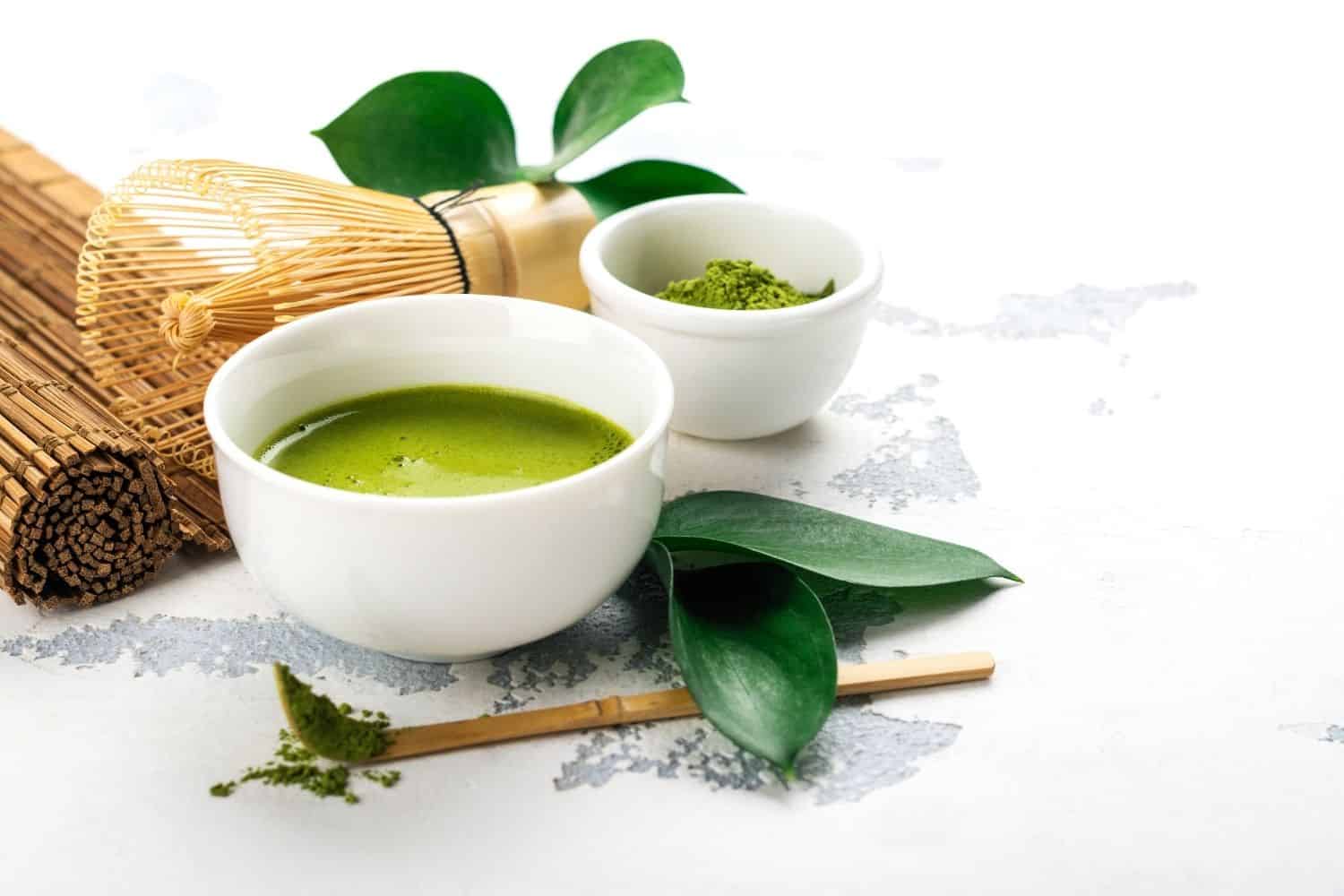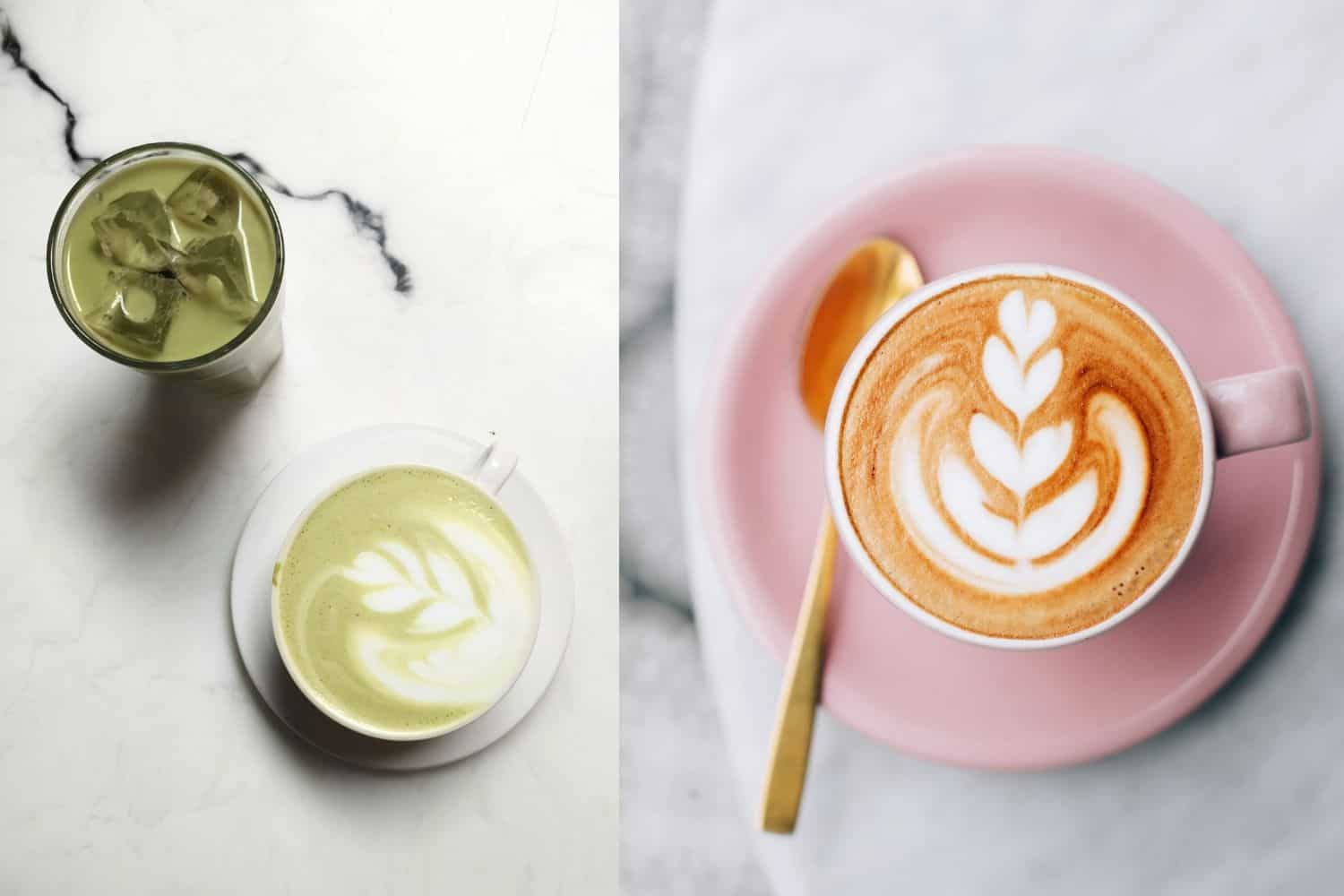Coffee is one of the most loved beverages worldwide. It’s a drink that almost everyone has ever tasted or heard about coffee. However, not everyone may have heard about matcha.
Regardless, matcha is increasingly becoming more popular across the globe.
In this article, you’ll learn more about match and coffee, including what they are, their caffeine content, health benefits, differences, and health risks.
What is Matcha?

Matcha is a form of tea that’s specially made from young tea leaves that are ground to form a powder. The powder is whisked with enough hot water.
These tea leaves are obtained from a plant known as camellia sinensis. Tea leaves for making matcha are specially planted under a shade or cover. That way, they won’t come into contact with direct sunlight.
Their cultivation process enhances the amount of amino acid and chlorophyll in the leaves. As a result, the leaves get a dark green color. If they’re exposed to sunlight, they’ll form a compound known as catechin that makes green tea relatively bitter.
Matcha originated from China. However, it’s strongly tied to Japan. According to the history behind matcha, a Japanese Buddhist visited China in search of green tea.
He realized that consuming matcha before meditating assisted in maintaining concentration. Thus, he brought matcha back home.
What is Coffee?

On the other hand, coffee is derived from coffee beans of a flowering plant known as coffea. The main varieties of coffee beans include Arabica coffee and Robusta coffee.
The beans are harvested, processed, roasted, and ground into various grind sizes. Ground coffee is brewed using a preferred brewing method to make ready coffee.
Coffee is loved for its caffeine, warm flavor, and smooth texture. Generally, the caffeine content depends on the roast level.
Lighter roasts contain a higher caffeine content and a milder taste whereas darker roasts contain a lower caffeine content and a stronger taste.
Coffee is available in many forms including black coffee, espresso, cold brew, iced coffee, and decaf coffee among others. Coffee can also be combined with extra seasonings, syrups, and flavors depending on your taste preferences.
Matcha Vs Coffee Nutrient Comparison
When comparing their nutrient content, both matcha and coffee contain a low-calorie content when served without adding ingredients such as flavored syrups, cream, milk, and sugar.
Making regular matcha involves mixing hot water and matcha powder while making regular coffee involves brewing ground coffee with hot water.
So does coffee or matcha have more caffeine? Generally, a standard cup of regular coffee (8-ounce serving) contains 96 milligrams of caffeine while a 2-ounce serving of standard matcha contains about 19 to 44 milligrams of caffeine. Thus, coffee contains more caffeine than matcha.
The caffeine content in matcha depends on the freshness and variety of the tea leaves. Also, it depends on the brewing time and water temperature.
On the other hand, the amount of caffeine in coffee depends on the roast level, brewing method, type of beans, and the amount of grounds used when brewing.
You’ll notice a relatively bitter taste in both beverages when served without any additives. Generally, coffee has a chocolaty, nutty, and aromatic flavor while matcha features an earthy or grassy flavor.
Health Benefits of Drinking Coffee
Coffee is a widely researched beverage, thanks to its wide popularity. The dark, flavorful drink is packed with several important compounds that have been found to have numerous health benefits such as:
- Reduces inflammation
- Improves athletic performance and strength
- Improves cognitive function and focus
- Lowers the risk of developing diabetes
- Lowers the risk of developing some cancers
- Reduces hypertension
Coffee contains minerals, vitamins, and antioxidants that contribute to its numerous health benefits. For instance, research shows that the polyphenols in coffee offer anti-hypertensive, anti-cancer, and anti-inflammatory benefits.
When consumed moderately, coffee may reduce the risk of developing endometrial and liver cancer.
These benefits are offered by both decaffeinated and caffeinated coffee. The phytochemicals found in coffee reduce inflammation.
Coffee is mostly loved due to its caffeine compounds. Caffeine offers stimulating effects. That’s why many people take a cup of coffee after waking up. In fact, caffeine is the most studied ingredient in coffee.
Although caffeinated coffee contains more caffeine than decaf coffee, they share several health benefits. Thus, coffee contains other important ingredients besides caffeine.
Besides boosting mental acuity, coffee also enhances performance. It works by boosting muscle contraction. Also, coffee is linked to increased weight loss by boosting metabolism, especially when taken as black coffee without additives.
Drawbacks of Coffee
Coffee comes with certain drawbacks including:
- It may have some side effects, especially when taken excessively. Possible side effects include insomnia, elevated heart rate, anxiety, headache, and insomnia.
- It can cause addiction. Since caffeine works as a stimulant, drinking coffee excessively can lead to addiction.
Health Benefits of Drinking Matcha
Matcha is linked to many health benefits such as:
- Enhances mental focus
- Improves quality of sleep
- Improves cognitive function
- Boosts energy
- Improves relaxation
- Improves the functioning of the immune system
- Increases the production of serotonin
- Reduces blood pressure
- Lowers the risk of developing certain cancers
- Reduces inflammation
Matcha contains a type of amino acid known as L-theanine. It gives matcha a unique flavor.
The amino acid creates a calming and longer-lasting energy effect whereas coffee gives an instant energy boost that doesn’t last long and causes jitters.
Research shows that L-theanine boosts the functionality of the immune system. Also, it reduces blood pressure, making it great for individuals suffering from hypertension.
It also stimulates the production of a transmitter known as serotonin that reduces stress and boosts mood. Also, boosting serotonin levels assists in lowering blood pressure.
It also reduces cortisol levels. Cortisol is a type of stress hormone, which causes increased appetite and inflammation.
Also, matcha contains a phytochemical known as EGCG that boosts fat metabolism, thanks to its potent thermogenic properties. As a result, it assists the body to burn calories.
Additionally, matcha contains numerous antioxidants. These antioxidants assist in preventing damage to body cells and repairing damaged cells. Thus, antioxidants are important in reducing the risk of developing cancer.
Drawbacks of Matcha
Just like coffee, matcha also comes with some drawbacks including:
- Excessive consumption of polyphenols and EGCG in matcha can cause liver damage.
- Matcha is often more expensive than coffee.
- Since matcha comes in the form of powdered tea leaves, it may contain contaminants like heavy metals.
Main Differences between Matcha and Coffee

Both beverages offer the benefit of boosting energy levels. However, they have several differences.
Coffee is mostly loved due to the quick energy boost it offers, especially after waking up. Its caffeine content assists in reducing fatigue and sleepiness.
It works fast because the body absorbs caffeine rapidly. As a result, the concentration of caffeine in the blood can reach peak levels in about 15 minutes upon drinking coffee.
Once the body absorbs caffeine, it reaches the brain through the blood. Caffeine blocks adenosine receptors in the brain. Adenosine receptors are compounds that promote sleep. You’ll stay awake once these receptors get blocked.
Although matcha contains a significant caffeine content, it takes more time for its effects to start working. Thus, coffee is more ideal than matcha for anyone who wants a quick energy boost. However, matcha offers a longer-lasting energy boost than coffee.
Also, matcha contains a type of amino acid known as L-theanine. The amino acid is beneficial in that it reduces stress by boosting alpha rhythm in the brain.
L-theanine is absorbed rapidly such that it reaches the brain quickly. Research shows that a combination of caffeine and L-theanine in matcha can increase alertness and reduce tiredness. On the other hand, coffee doesn’t contain L-theanine.
Health Risks of Coffee and Matcha
Both coffee and matcha contain caffeine. Thus, you should avoid excessive consumption of these beverages. It’s recommended to drink not more than 3 cups of either drink per day. Regardless of the size of the serving, don’t consume more than 400 mg of caffeine per day.
Excessive consumption of caffeine can cause health issues such as:
- Insomnia
- Elevated breathing rate
- Elevated heart rate
- Headache
- Increased anxiety
- Diarrhea
Since coffee contains more caffeine content than matcha, consuming it excessively can cause addiction.
Matcha may contain lead. The plant may absorb lead from the surrounding environment during its growth. About 90 percent of the absorbed lead remains on the matcha tea leaves. Since matcha is made from ground leaves, you may ingest lead, which is a dangerous heavy metal.
Research shows that matcha contains about 30 times the amount of lead in green tea. Thus, stick to not more than 3 cups of matcha per day. Also, avoid giving matcha to kids.
When choosing matcha, consider a product that has been tested for heavy metals such as lead. If you’re pregnant or allergic to caffeine, consult your doctor before consuming matcha or coffee.
Is Matcha A Good Substitute For Coffee?
If you’re wondering which is better between coffee and matcha, it all depends on your taste preferences, your goals, and how you drink your beverage.
There’s absolutely nothing wrong or right on the drink to choose. Thus, you don’t have to substitute one for the other not unless your goals and taste preferences change. Both drinks offer numerous health benefits.
Regardless, you can make your choice based on various considerations including:
-
Caffeine content
Although matcha contains more caffeine than regular tea, it has a lower caffeine content than coffee. If you prefer tea with a higher caffeine content, then consider drinking matcha. If its caffeine content is not enough for you, then consider drinking coffee.
-
Preferred additives
The kind of additives you prefer adding to your beverage may help to determine your best option. If you prefer adding sugar and cream to your drink, then consider choosing coffee. On the other hand, if you prefer fewer calories, matcha would be the best alternative.
-
Health benefits
While both drinks offer numerous health benefits, research shows that matcha may offer more benefits. In fact, matcha offers more benefits than green tea. It contains a higher amount of vitamins, antioxidants, phytonutrients, and minerals.
-
Flavor preferences
Matcha can be a great substitute for coffee for anyone who wants a hot drink that contains caffeine but is not bitter like coffee. Also, matcha will give you the caffeine you need without the jitters that come with drinking coffee.
-
Performance gains
If you prefer a drink that can boost your strength for better performance in outdoor activities or the gym, coffee would be your best pick. On the other hand, matcha is more ideal for enhancing performance in exercises that require endurance.
Final Thoughts
Both matcha and coffee are rich in antioxidants, caffeine, and share some essential health benefits. They’re both great for reducing the risk of developing cancer and heart disease.
Also, they increase energy levels and promote weight loss. Although coffee contains a higher caffeine content than matcha, matcha contains L-theanine that makes its caffeine effects slower but gentler.
The caffeine content in coffee acts quickly and causes jitters. Ultimately, the best choice between the two is all about your personal preferences.